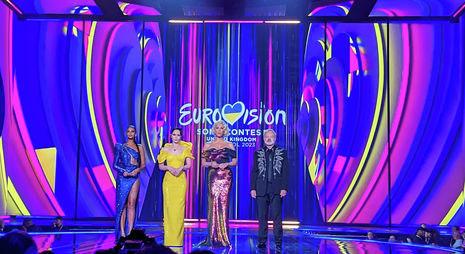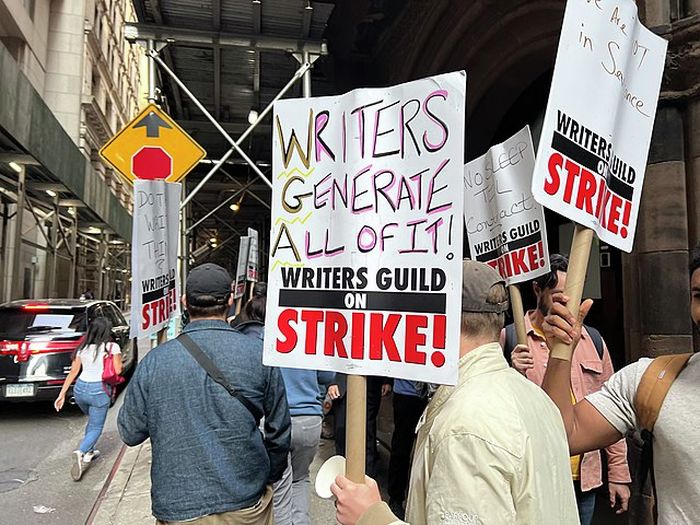Eurovision 2023: ‘United by Music’
Sofia Johanson relives the euphoria of Eurovision 2023, recounting everything from its ballad-singing dreamboats to Mel Giedroyc’s butter churning.

There are very few times of the year that it is exciting to be Swedish. Mid-may is one of them. I don’t only say that in light of Loreen’s second Eurovision victory, but also because of the euphoric mania that overcomes us Swedes when the competition is approaching. Luckily, I am half British, so I don’t get too carried away and am still able to detect the absurdity of the whole thing.
And 2023’s iteration catered perfectly to these twin sensibilities of excitement and bewilderment. In his introductory voiceover, Graham Norton cites his inability to believe that the UK is hosting the competition, as members of Ukraine’s Kalush Orchestra (in their bizarre garb, including a too-large pink fuzzy bucket hat, a patterned mask and jumpsuits made up purely of tassels) assemble in a metro station with their woodwind instruments to perform last year’s winning song, Stefania. The theme, ‘United by Music’, becomes immediately evident as the rousing performance is joined by Andrew Lloyd Webber and the Princess of Wales on piano, various British artists (like Ms Banks) who sing in English, and dancers from the UK and Ukraine.
Indeed, the Grand Final did truly feel like a joint venture between the two nations; two of the hosts were British (Alesha Dixon, Hannah Waddingham) and one was from Ukraine (Julia Sanina, frontwoman of band The Hardkiss). Ukrainian patterns and national dress also appeared in the visuals and onstage repeatedly, while Ukrainian bands performed during the flag procession, and Mel Giedroyc wittily explained that the show was being broadcast from Lviv-erpool.
“[Finland’s entry] defies musical categorisation as much as its human-caterpillar choreography defies explanation”
As is to be expected, the entries were incredibly diverse, consisting of the usual combination of ballads, sugar-pop anthems, and the classic what-on-earth-is-this numbers. And we had the postcards (short clips designed to introduce the audience to each participating act), which were mercilessly mocked by Graham, subtly reassuring us that he wouldn’t be more polite about the show just because the BBC was running it.
Of course, Sweden came away with the trophy (and the right to host next year’s competition) thanks to Loreen’s dance-pop song Tattoo, which had been heavily tipped to win and had been playing on Swedish radio for weeks beforehand. And we certainly can’t ignore the absolute chaos of Finland’s second-place entry Cha Cha Cha, which defies musical categorisation as much as its human-caterpillar choreography defies explanation. Other highlights included Norway’s mediaeval-dance fusion feminist anthem and Lithuania and Estonia’s strong female vocals, whilst Twitter had an absolute field day with the ballad-singing dreamboats from Italy and Cyprus.
Yet it’s about so much more than the madness of the music. Czechia’s all-female group had knee-length braids which they swung around like rhythmic gymnastics ribbons, France’s singer towered above the stage in a dress that made her reminiscent of the Eiffel Tower and Belgium’s entry had a striking resemblance to Boy George. Political messages were thin on the ground this year, although Croatia made up for it with their bonkers anti-dictator anthem in which they repeated the line ‘Mama bought me a tractor’ several times in an allusion to the time when Aleksandr Lukashenko apparently gifted Vladimir Putin a tractor.
“Mae Muller placed second from last with Instead I wrote a song, and this time we can’t even blame it on Brexit”
And then we got to the voting, at which point I imagine the less-committed viewers (read: those who have been forced to watch it) mentally check out, but the fanatics know that this is not only a moment of long-drawn-out tension, but also when the most bitingly entertaining comments are made on the BBC voice over. Usually, it would be Graham eviscerating the various delegates’ outfit choices, but as he had migrated to the stage to present the show, we were graced with Mel Giedroyc’s analysis. She perfectly emulated Graham’s sass, without coming off as a try-hard, meanwhile her butter-churning (an allusion to a particularly sexual Polish entry a few years ago) caused an absolute riot in Twitter, as the world was divided into the horrified - those who did not get the reference - and the highly approving - those who did, and respected her commitment to the Eurovision mania.
Sadly, we can’t ignore the UK’s return to the bottom of the leaderboard. Mae Muller placed second from last with Instead I wrote a song, and this time we can’t even blame it on Brexit. Whilst I was baffled by one news outlet’s explanation that perhaps the lyrics were too complex for non-English speakers, she doesn’t seem too embarrassed in her self-deprecating Instagram reel, captioned ‘When someone asks me how well I did at Eurovision’, in which she mimes the words, “well…well…next question…see ya!” before dashing off camera.
And finally, Loreen, overcome by emotion (or fully consumed by her self-proclaimed ‘meditative state’), tottered up to the stage to receive her trophy, before treating us to another performance of Tattoo, allowing Twitter to post a whole other ream of tweets saying it looked like she was emerging from a panini press.
Thanks to Loreen, we can look forward to the return of the masters of Eurovision – they’ve hosted it 3 times since 2000. Whether they pitch up in Stockholm for a third time, or grant the honour of hosting to a regional city, as is becoming increasingly popular, remains to be seen. What is certain is that we will not be deprived of glitter, absurdity, or joy in May 2024.
The Eurovision Song Contest is available to watch on BBC iPlayer
 News / Cambridge postgrad re-elected as City councillor4 May 2024
News / Cambridge postgrad re-elected as City councillor4 May 2024 News / Gender attainment gap to be excluded from Cambridge access report3 May 2024
News / Gender attainment gap to be excluded from Cambridge access report3 May 2024 News / Some supervisors’ effective pay rate £3 below living wage, new report finds5 May 2024
News / Some supervisors’ effective pay rate £3 below living wage, new report finds5 May 2024 News / Academics call for Cambridge to drop investigation into ‘race realist’ fellow2 May 2024
News / Academics call for Cambridge to drop investigation into ‘race realist’ fellow2 May 2024 Comment / Accepting black people into Cambridge is not an act of discrimination3 May 2024
Comment / Accepting black people into Cambridge is not an act of discrimination3 May 2024





